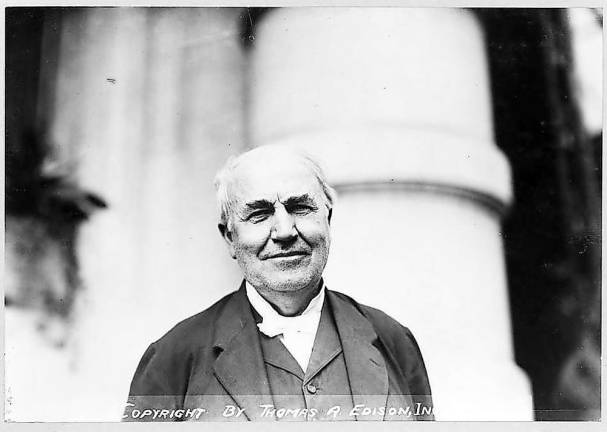Discover the Edison you don’t know
Sparta. Get to know “Offbeat Edison,” the marketing genius who invented talking dolls and rechargeable batteries, at the Sparta Historical Society’s Van Kirk Homestead Museum through Dec. 13.

Thomas Edison, yadda yadda yawn. But wait – what do you really know about him?
He did not invent the telegraph, nor the telephone, nor electricity. But he significantly improved them for universal use. He invented the phonograph but not the record player. Thomas was a pie-loving practical joker and storyteller who had a tattoo and loved “glamping.”
Get to know the real Thomas Edison! Professionally curated with rare treasures, “Thomas Alva Edison: The Person, the Vision, and His Genius” is delighting visitors at the Sparta Historical Society’s Van Kirk Homestead Museum through Dec. 13. Reserve your free guided tour at VanKirkMuseum.org.
Remember that before voicemail we had answering machines? While developing his telephone transmitter, Edison got the idea of creating a machine that could record and play back telephone messages. That notion led him to imagine being able to record not just voices, but music and other sounds, on a cylinder, which he patented in 1888 as the phonograph. Two years later Edison applied that technology to make talking dolls, which were not successful because they scared little girls and their parents!
In the late 1800s he invented rechargeable batteries, which were used in railroad signals and crossing gates, miners’ hard hat lamps, and submarines. These batteries were a huge safety improvement and turned into the most successful product of his later career.
A marketing genius
Not just an inventor, Edison was a marketing genius who improved on others’ ideas, found new uses for them, and put his name on everything. Around 1900 Edison Portland Cement Co. started producing concrete using some of the machinery left over from closing his Sparta mining operation, and with output greater than demand, he designed and licensed a process to build single-pour two-story cement homes, meant to be affordable and long-lasting – an entire Phillipsburg neighborhood is proof of that today.
Thomas was quite an efficient sleeper – he slept a dreamless 4-5 hours then power-napped as needed, and worked at home in addition to over 90 hours a week in his laboratory. Thus he was also an early distracted driver! His wife or son usually drove him, which gave him more time to think through challenges. How else could he have time to earn 1,093 U.S. patents?
Edison was one of the first glampers – glamorous campers. Starting in 1915 he took road trips with the Vagabonds: Henry Ford, Harvey Firestone, naturalist John Burroughs, and often a U.S. President. These trips were sometimes with wives and children, and were always quite an operation with staff, tables, tents, and large grills. These nature outings were relaxing and playful but also a time to share and discuss ideas to solve American issues. One issue was reliance on overseas sources for rubber in tires which could be crippling in a war, so Edison created the Edison Botanic Research Corp. in Florida to find and develop goldenrod as the most efficient domestic source of natural rubber for military vehicles and automobiles during the first World War.
“I want to save and advance human life, not destroy it,” he said. “I am proud of the fact that I have never invented weapons to kill.”
Looking back, Edison was ahead of his time in many ways. He was a huge advocate of wind and solar energy in the early 1900s, and in 1912 created a fully off-the-grid home full of his inventions. Earlier he had developed a reliable alkaline battery for electric cars, but his pal Henry Ford decided to instead use a combustion engine that used cheap gasoline for his cars. In 1931, not long before he died, Edison told his friends Henry Ford and Harvey Firestone: “We are like tenant farmers chopping down the fence around our house for fuel when we should be using Nature’s inexhaustible sources of energy sun, wind and tide. I’d put my money on the sun and solar energy. What a source of power! I hope we don’t have to wait until oil and coal run out before we tackle that. I wish I had more years left.”
Who knows what he would’ve done?
“We are like tenant farmers chopping down the fence around our house for fuel when we should be using Nature’s inexhaustible sources of energy sun, wind and tide. I’d put my money on the sun and solar energy. What a source of power! I hope we don’t have to wait until oil and coal run out before we tackle that. I wish I had more years left.” – Thomas Alva Edison